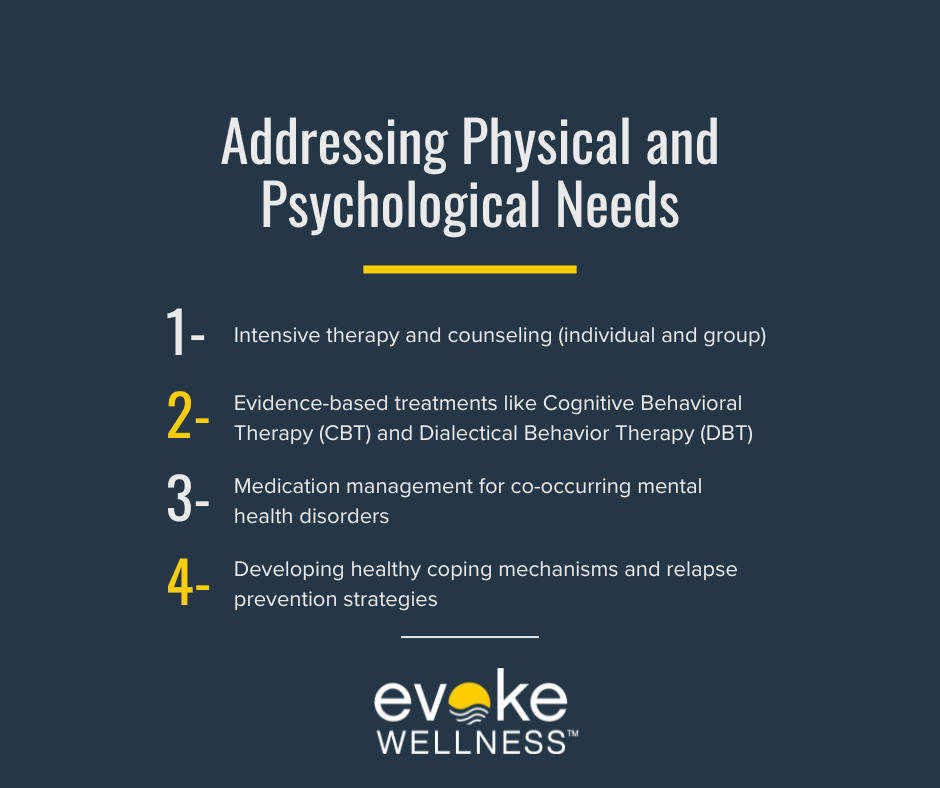As you emerge from detox, the next 30 days are crucial in establishing a solid foundation for your long-term sobriety. Recent studies show that individuals who engage in comprehensive aftercare programs are 40% more likely to maintain abstinence after one year. At Evoke Wellness at Cohasset, we understand the challenges you face during this critical period. Our evidence-based approach combines aftercare services, group therapy, and proven therapeutic modalities like Cognitive Behavioral Therapy (CBT) and Dialectical Behavior Therapy (DBT) to equip you with the tools necessary for lasting recovery. In this article, we’ll explore the essential steps and strategies to navigate the first month post-detox, setting you on the path to a healthier, substance-free life.
Together, let’s embrace the journey to recovery and the promise of a new beginning. Call us at (617) 917-3485 today or reach out online.
The Importance of the First 30 Days After Detox
Establishing a Solid Foundation
The first 30 days after detox are a critical period that lays the groundwork for long-term sobriety. This initial phase is when individuals are most vulnerable to relapse, making it essential to establish a strong foundation through comprehensive support and care. According to a study by Stanford’s Human-Centered AI group, the risk of relapse is highest within the first 90 days of recovery, underscoring the importance of this crucial window.
Addressing Physical and Psychological Needs
Detox addresses the physical aspect of addiction, but the journey to recovery extends far beyond. Evoke Wellness emphasizes that the first 30 days should focus on addressing the psychological and emotional components that contribute to substance abuse. This holistic approach involves:
Creating a Supportive Environment
A safe, structured environment is crucial during this vulnerable phase. Residential treatment programs provide 24/7 monitoring and support, allowing individuals to focus solely on their recovery without external triggers or distractions. This immersive setting fosters:
- Peer support and a sense of community
- Exploration of underlying issues and triggers
- Skill-building for daily life in sobriety
- Integration of holistic wellness practices
Continuing Care and Aftercare Services
The first 30 days are just the beginning of a lifelong journey. Aftercare and relapse prevention strategies are essential for maintaining sobriety. These may include:
- Outpatient therapy and counseling
- Support group meetings
- Sober living arrangements
- Ongoing medical care and medication management
- Regular check-ins and accountability
By prioritizing the first 30 days and establishing a robust foundation, individuals can increase their chances of achieving lasting recovery and reclaiming their lives.
What to Expect in Your First Month of Sobriety?
Withdrawal Symptoms and Cravings
In the initial weeks after detox, withdrawal symptoms like insomnia, anxiety, and nausea may persist as your body adjusts to being alcohol-free. Intense cravings are common and can make the first month challenging. However, medically-supervised detox programs provide medications and therapies to ease these discomforts.
Emotional Rollercoaster
Expect a range of emotions as you transition to sobriety. You may experience sadness, anger, or fear as underlying issues resurface. Mood swings and feeling overwhelmed are normal. This emotional turbulence underscores the importance of continuing care and support after detox.
Lifestyle Adjustments
Sobriety means adopting new daily routines and coping strategies. Building a recovery-focused lifestyle involves identifying triggers, prioritizing self-care through exercise and nutrition, and fostering a sober support network. It takes time to find balance, but staying committed to your sobriety journey is crucial.
Therapy and Support Groups
Comprehensive addiction treatment doesn’t stop after detox. Continuing with evidence-based therapies like cognitive-behavioral therapy (CBT) and dialectical behavior therapy (DBT) can help address the root causes of addiction. Group therapy and support groups provide a sense of community and accountability.
According to the Substance Abuse and Mental Health Services Administration (SAMHSA), 14.5 million people aged 12 and older had Alcohol Use Disorder in the US in 2019, highlighting the prevalence and need for comprehensive treatment options during this critical first month of sobriety.
The Role of Aftercare Services in Early Recovery
Transitioning to Outpatient Care
As individuals leave intensive inpatient treatment, aftercare services provide crucial support during this vulnerable transition period. Outpatient programs offer continued therapy and counseling, reinforcing coping strategies and relapse prevention techniques learned in residential care. This stepped-down approach eases the adjustment to independent living while maintaining accountability and access to professional resources.
Strengthening Recovery Skills
In the early months of sobriety, aftercare programs emphasize building a solid foundation of recovery skills. Cognitive Behavioral Therapy (CBT) and Dialectical Behavior Therapy (DBT) equip individuals with tools to manage cravings, identify triggers, and develop healthier thought patterns. These evidence-based therapies, often delivered in group settings, foster a supportive community where experiences can be shared and lessons reinforced.
Cultivating Sober Support Networks
Loneliness and isolation are significant risk factors for relapse. Aftercare services actively promote involvement in 12-step programs and alumni networks, connecting individuals to a vibrant community of peers in recovery. These sober support systems provide invaluable guidance, inspiration, and accountability, helping individuals navigate the challenges of early sobriety while building lasting friendships grounded in shared experiences and goals.
Addressing Underlying Mental Health Needs
For many, substance abuse co-occurs with mental health conditions, requiring an integrated approach to treatment. Aftercare services offer ongoing psychiatric evaluation and therapy to manage issues like depression, anxiety, and trauma. By addressing these underlying factors, individuals can achieve greater emotional stability and find genuine happiness in their newfound sobriety.
Comprehensive aftercare is pivotal in solidifying the gains made during initial treatment, empowering individuals to maintain lasting recovery. With continued support and skill-building, the first months of sobriety can mark the beginning of a fulfilling, addiction-free life.
Building a Support Network for Sobriety
Embracing Peer Support Groups
Participating in peer support groups like Alcoholics Anonymous (AA) or Narcotics Anonymous (NA) can provide an invaluable source of strength and accountability during early recovery. Studies show that individuals who actively engage in 12-step programs have significantly higher rates of maintaining long-term sobriety. These groups offer a safe space to share experiences, learn from others’ journeys, and develop essential life skills like asking for help and relying on a supportive community.
Cultivating Healthy Relationships
Surrounding yourself with positive influences who understand and support your commitment to sobriety is crucial. Building a lifestyle that reinforces healthy habits and fosters meaningful connections can provide a strong foundation for lasting recovery. This may involve distancing yourself from toxic relationships or environments that trigger substance use while actively seeking out sober-friendly activities, hobbies, and social circles.
Seeking Professional Support
In addition to peer support, ongoing counseling and therapy can be immensely beneficial in addressing the root causes of addiction and developing coping strategies for triggers and cravings. Evidence-based therapies like cognitive-behavioral therapy (CBT) and dialectical behavior therapy (DBT) can help individuals in recovery develop healthy thought patterns, regulate emotions, and build resilience against relapse.
By actively participating in support groups, nurturing positive relationships, and seeking professional guidance, individuals can cultivate a robust network that provides accountability, encouragement, and the tools necessary to navigate the challenges of sustained sobriety successfully.
Navigating the Challenges of the First 30 Days
Embracing the Difficulty
The first 30 days after detox are widely considered the most challenging period for those in recovery. This initial month tests your commitment and resilience as you adjust to a sober lifestyle. According to a study by the National Institute on Drug Abuse, the risk of relapse is highest during the first 90 days after treatment. However, successfully navigating this crucial window strengthens your foundation for long-term sobriety.
Managing Cravings and Triggers
Cravings and triggers are common hurdles in early recovery. Utilizing coping strategies learned in treatment, such as cognitive-behavioral therapy (CBT) and dialectical behavior therapy (DBT), can help manage these challenges. CBT teaches you to identify and reframe negative thought patterns, while DBT focuses on mindfulness, emotion regulation, and distress tolerance.
Celebrating Milestones
While the first 30 days present difficulties, it’s essential to recognize and celebrate your progress, no matter how small. Acknowledging milestones like completing your first sober week or attending your tenth support group meeting can boost motivation and reinforce your commitment to sobriety.
Aftercare and Support Systems
Leveraging aftercare services and building a robust support system are invaluable during this transitional period. Ongoing individual and group therapy sessions, combined with the guidance of a recovery coach or sponsor, can provide the accountability and encouragement you need to stay on track.
What to Expect After 30 Days of Sobriety?
Physical and Mental Transformation
After 30 days of sobriety, your body and mind undergo a remarkable transformation. Physically, you’ll experience improved sleep, increased energy levels, and a revitalized appearance as your skin and overall health begin to recover. According to Evoke Wellness, this period can repair liver function, enhance digestion, and promote weight loss by eliminating the high caloric intake from alcohol.
Mentally, you’ll likely experience a rollercoaster of emotions, including mood swings, feelings of happiness, relief, anger, and even grief. However, as the brain fog clears, you’ll notice improved mental clarity, memory, and concentration. Evoke Wellness emphasizes the importance of developing healthy coping strategies, such as revisiting old hobbies, spending time in nature, and practicing self-reflection through journaling.
Managing Withdrawal Symptoms
While the initial acute withdrawal phase may have passed, some individuals may experience Post-Acute Withdrawal Syndrome (PAWS). As explained by Evoke Wellness at Cohasset, PAWS can cause persistent psychological and physiological symptoms like anxiety, insomnia, fatigue, and mood swings. To alleviate these symptoms, medications like Ativan (lorazepam) can promote relaxation and better sleep, while therapy and lifestyle changes can provide long-term coping strategies.
Building a Strong Foundation
The first 30 days of sobriety lay the groundwork for your recovery journey. Evoke Wellness at Cohasset recommends seeking support through inpatient rehab programs, which offer a structured environment, personalized care, and the ability to temporarily avoid relapse-inducing stressors. By immersing yourself in a supportive community, you’ll develop the tools and habits necessary for long-term sobriety.
Remember, the road to recovery is a marathon, not a sprint. Celebrate small milestones, be open about your challenges, and seek professional help when needed. With patience, perseverance, and the right support system, the first 30 days can pave the way for a healthier, more fulfilling life in sobriety.
Conclusion
As you embark on your journey to sobriety, remember that the first 30 days after detox are crucial for building a strong foundation. By actively engaging in aftercare services, group therapy, and evidence-based treatments like CBT and DBT, you significantly increase your chances of long-term recovery. Recent studies show that individuals who participate in comprehensive aftercare programs have a 60% higher rate of sustained sobriety after one year. Your commitment to ongoing support and self-improvement during this critical period will shape your future success. Embrace the challenges, celebrate small victories, and lean on your support network. With dedication and the right tools, you can navigate this transformative time and emerge stronger, ready to embrace a life of lasting sobriety.
Begin Your Journey with Evoke Wellness at Cohasset
If you or a loved one is considering treatment, Evoke Wellness at Cohasset invites you to contact us. Our compassionate team is ready to answer your questions, discuss your needs, and help you take the first steps toward recovery. In Cohasset, you’ll find more than just a treatment program – you’ll discover a community dedicated to your wellness and success. Together, let’s embrace the journey to recovery and the promise of a new beginning. Call us at (617) 917-3485 today or reach out online.





